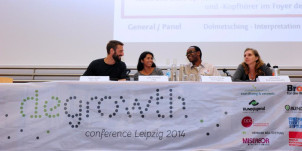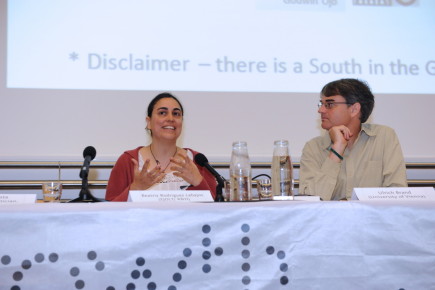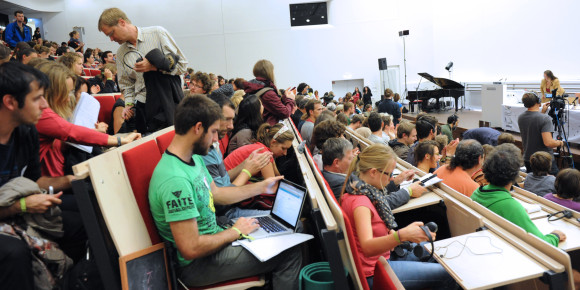
By Nick Meynen.
Why are a record 3000 thinkers gathering from 2 to 6 September in the German city Leipzig to discuss how we can get our economy to degrow? One reason is that a growing body of research from various disciplines shows that a policy focus on GDP growth is the major driver behind the long-term destruction of the conditions that make live enjoyable on this Earth. Another is that it makes sense to look into how all people on this planet could have a good life – an impossible feat if we stick to the current GDP growth model.
According to author and activist Naomi Klein “everything is easier than imagining to change capitalism” but that is what is needed to avoid a climate catastrophe – as the IPCC admits in more diplomatic terms in their already leaked draft report slated for November. She made clear that, when it comes to addressing the climate crisis, we as humans have failed catastrophically. Not in theory, but in practice, given that the first climate negotiations started in 1990 and emissions have gone up by 61 percent since then, which brings us on a path towards runaway climate change that makes life much harder for billions. She sees the establishment of the global free-trade-regime in parallel to the climate negotiations as one of the main reasons for the failure to address climate change. “We need an economy which expands in the quality of how we treat and take care of each other – and contracts in how we exploit resources.”
Alberto Acosta, former energy and mining Minister of Ecuador, professor in economy and president of the last Constituent Assembly of Ecuador, made it very clear that it is not enough to simply do away with the growth paradigm. That is why the focus of the 2014 conference is on concrete steps towards a society beyond the imperative of growth. Scientific debates, exchanges between activists and economic pioneers are looking at how to deal with the state, how to deal with the market and how to let the degrowth economy beyond state and market grow. If that sounds contradictory: it’s not. Degrowth is about a transition of one economic model – founded on increasing extraction of non-renewable resources – in order to give emphasis to the blossoming of different models: based on sharing, justice, the commons, transition towns and being sustainable. The negative connotation of the word ‘degrowth’ makes many people look for another word such as post-growth: how society looks like once we abandon the idea that GDP growth = good.
Silke Helfrich, who wrote the popular book “The Wealth of the Commons. A world beyond market and state” fired the public up with her enthusiasm. There was rap poetry by Nnimmo Bassey, a Right Livelihood Award winner speaking on the connections between climate justice activism in the South and degrowth debates in the North. An abundance of artists are giving the conference a flair of being a creative hotspot of positive energy and testimonies of the already existing “real life solutions”, as the Indian writer Ashish Kothari says. There’s finally a urgent need for a growing number of organisations and collectives to discuss what growth has meant in the history, who has really benefitted from it and how this has generated growing disparities both in the North and in the South.
Everyone knows that this will be a tough nut to crack. Until now, the degrowth debate is what one moderators called “a scientific and bourgeoisie discussion” limited to wacky professors, leftist students and alternative media – recently joined by climate justice activists from the South. But the potential to make alliances is huge. One example: the unions. How did a degrowth group convince an oil sector union to sign a memorandum saying that the oil industry should be abandoned in 30 years time? By talking with the workers themselves about more healthy, better and secure jobs in the public sector – something that a degrowth economy would need to provide. Or as the Engineer and EJOLT’s team member Willi Haas said: “Politicians always say we need GDP growth because we need jobs. Why the destructive detour? Why not just create the jobs?” That statement is backed up by a recent IDDRI study that shows that there is no clear correlation between economic growth and job creation. It says “In other words, for these authors of very different persuasions, there is no need for short-term growth to create employment. The need is more for policies that boost… employment.”
The bottom half of the world’s population owns the same as the richest 85 people in the world. Thomas Pikkety has proven that if left unchecked, the inequality rise of the past two or three decades will continue in the 21st century. Even some “enlightened” rich people realise that they won’t get away with it. The degrowth economy is not only needed to switch to a society living within planetary boundaries – it is also needed to stop a rapidly accelerating but eventually self-destructing process of wealth concentration. What degrowth proposes is to move from poverty reduction to wealth reduction. From GDP growth to growth in well-being for all. Whether it is through buen vivir or transitions towns or P2P (peer to peer) or gross national happiness: many pathways exist, with some being more fit for one society and others for another society. Ashish Kothari and Alberto Acosta rightly say we don’t need the same “model” for everybody, no need to impose again a way out to the whole world. What we need are plural forms of “buenos con-vivires”, and multiple forms of transition. Movements, communities, resistances and real life solutions are already converging like rivers do in their sacred sanghams generating millions of testimonies that the Thachearian TINA (There Is No Alternative) syndrome is finally over.
More information
http://leipzig.degrowth.org/en/
Sessions recorded in streaming available here
Opening keynote by Naomi Klein
Picture credits: Sonia Goicoechea







Pingback: Posting from the Leipzig conference on degrowth | Degrowth / Decroissance Canada
an addition, and some grammar/spelling corrections:
A no-growth paradigm is political dangerous as it collapses the inherent distinction between the genus and species of the capitalist mode of production. It is a fetishisation of use-values (raw materials), while ignoring the real pertinent question of the extent to which the working class has the power to determine and control the production process, and, thus, the total value that is produced and the total value that is ultimately distributed. Concisely, the central problem is how human labor is organized – a no-growth platform is alienating to people who depend on a wage for sustenance.